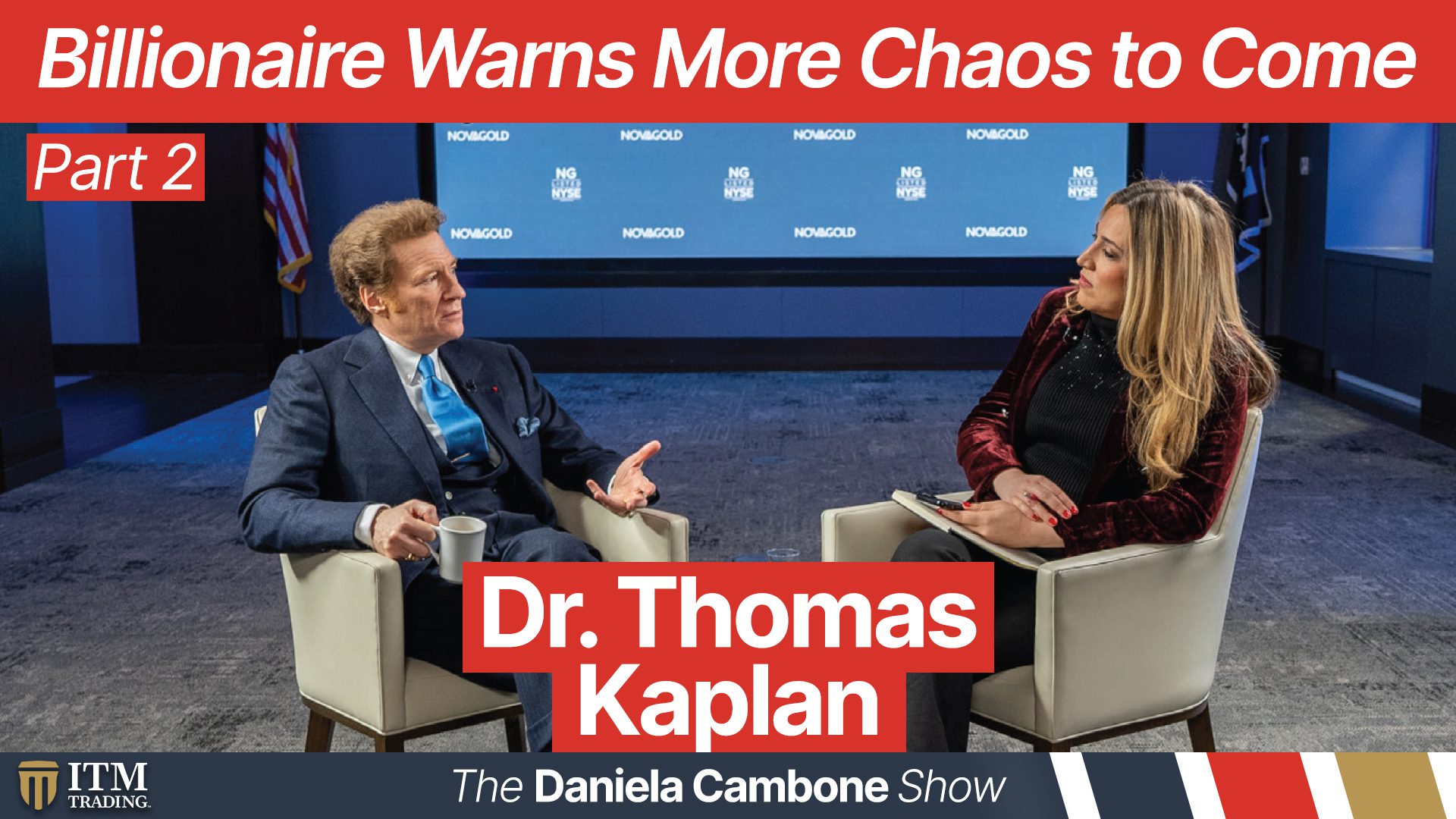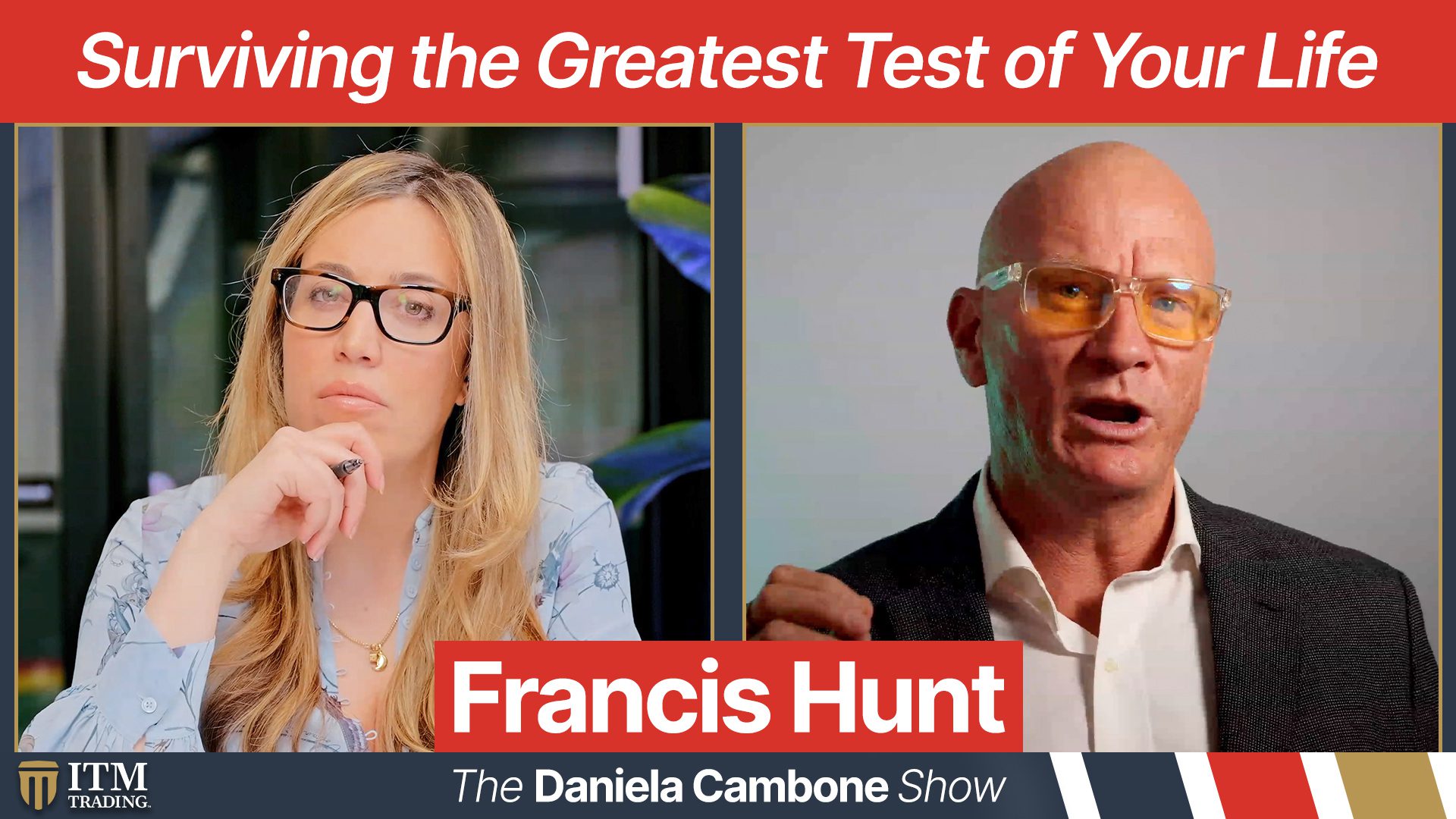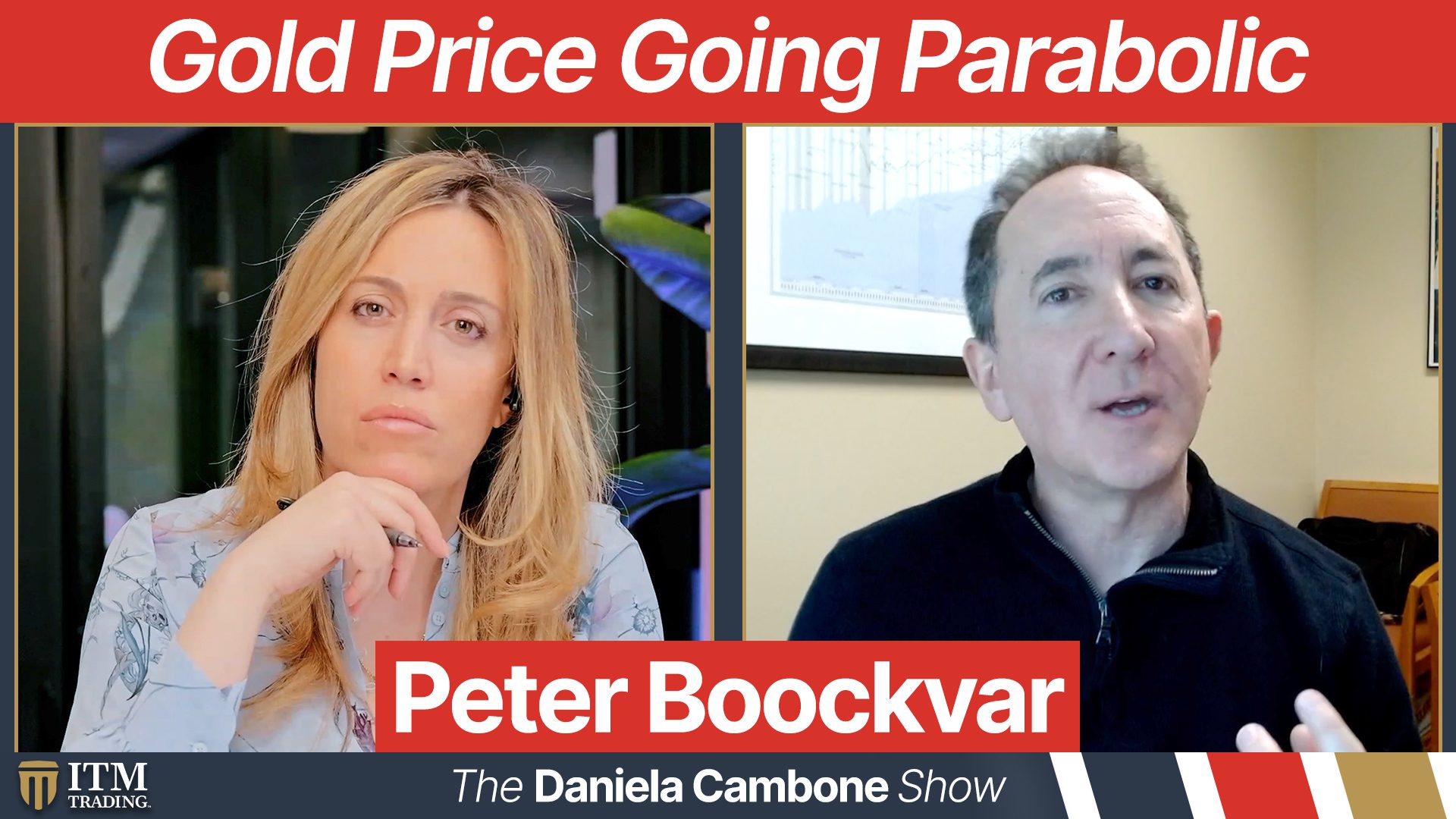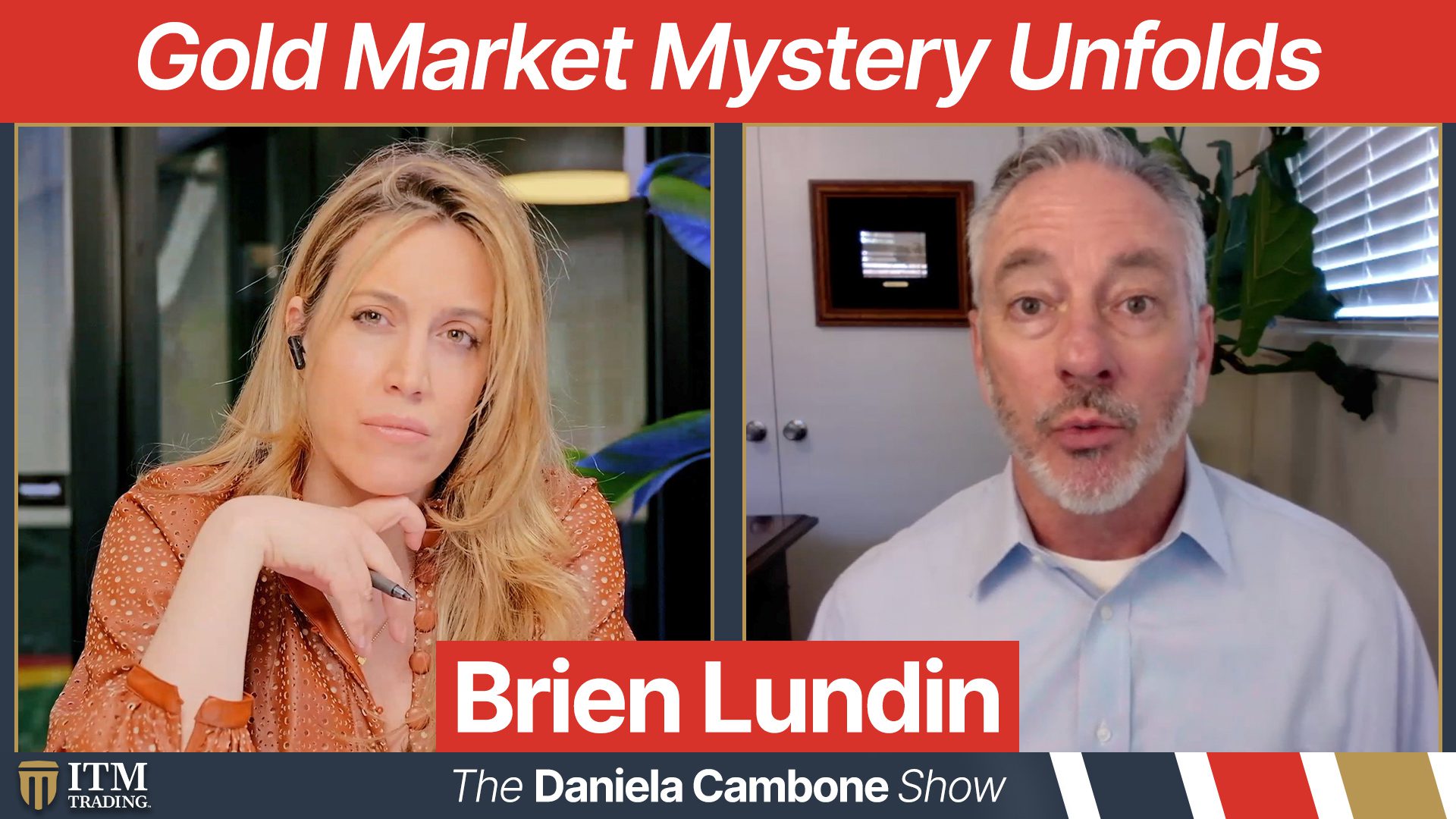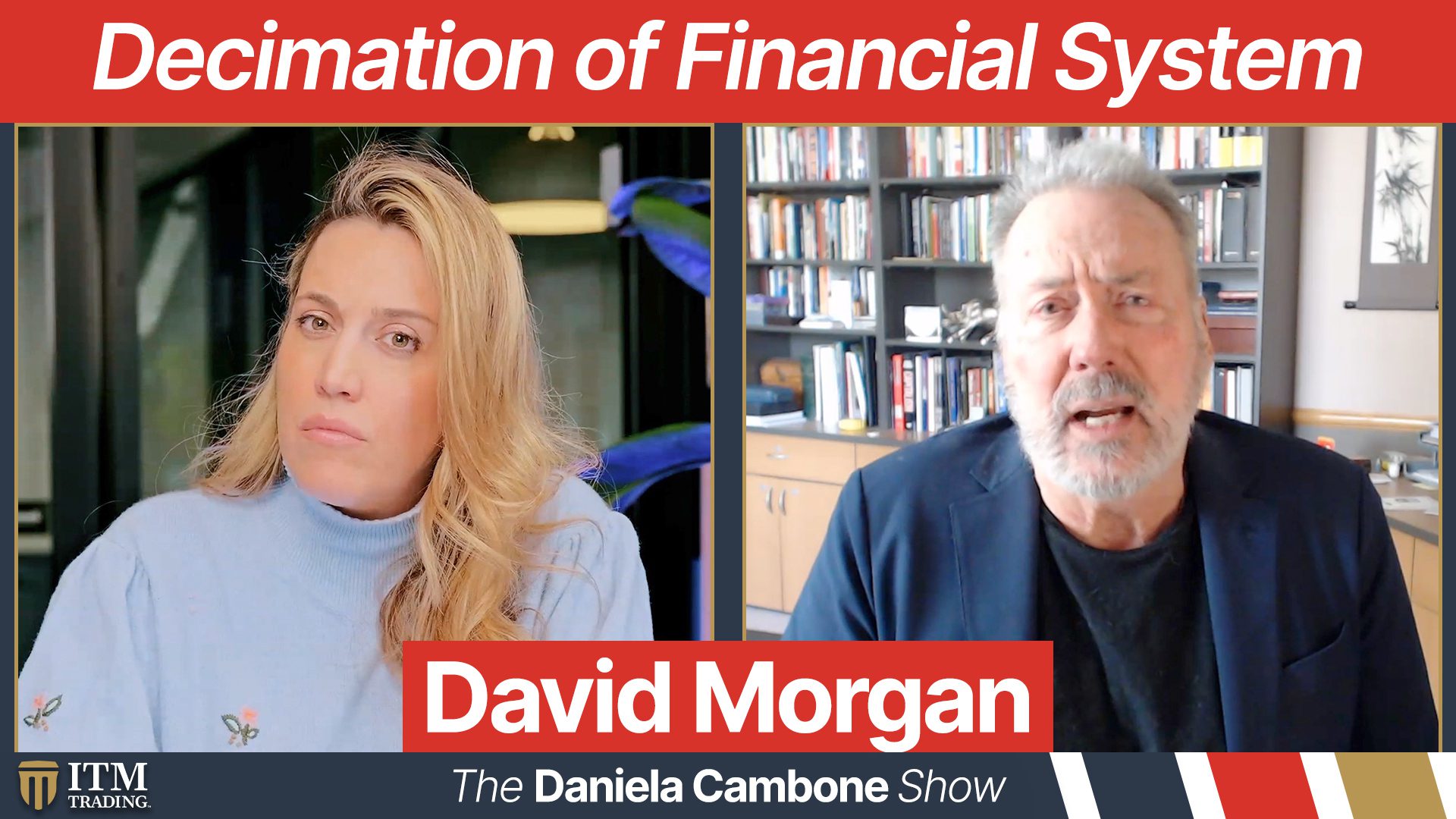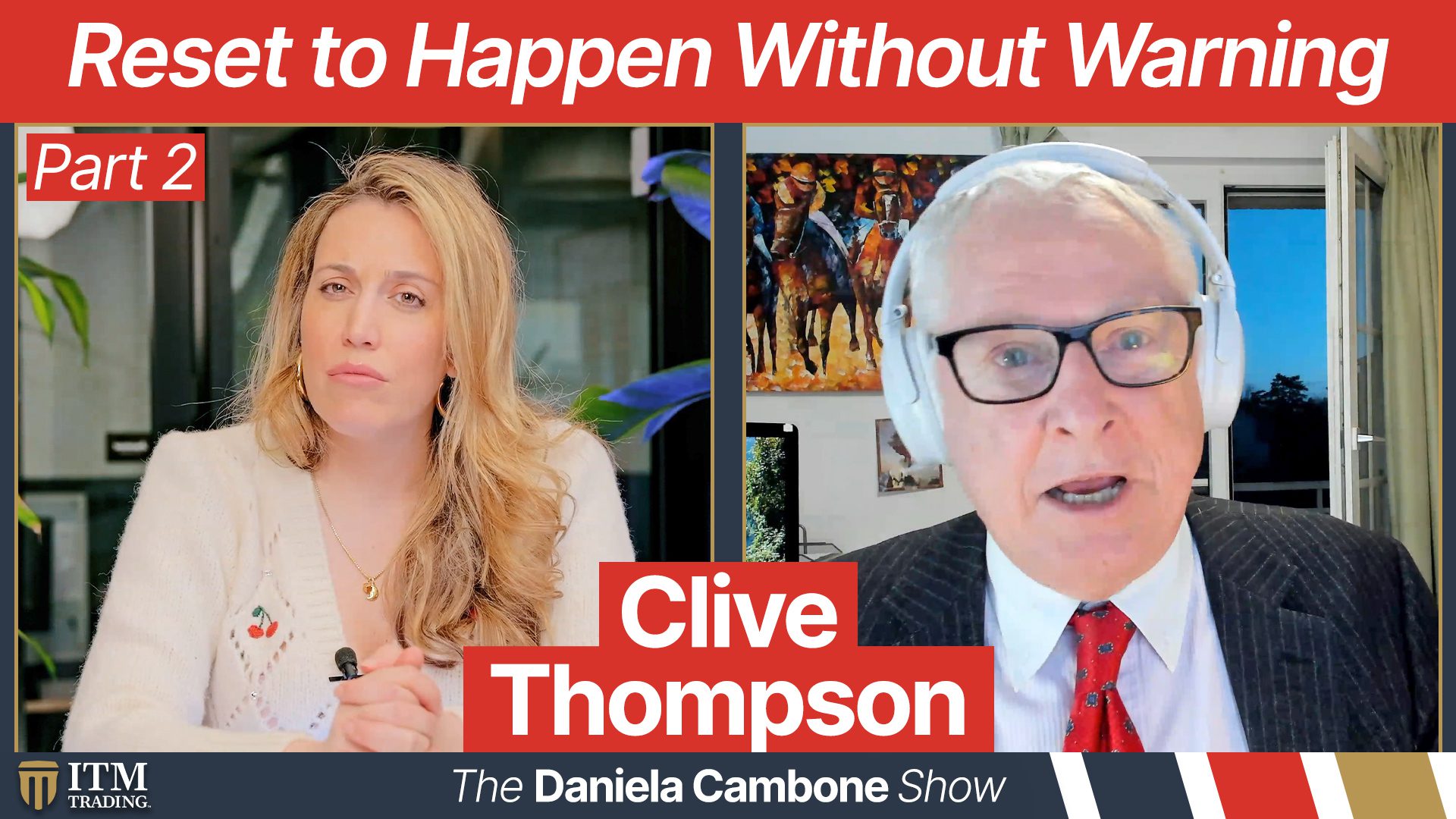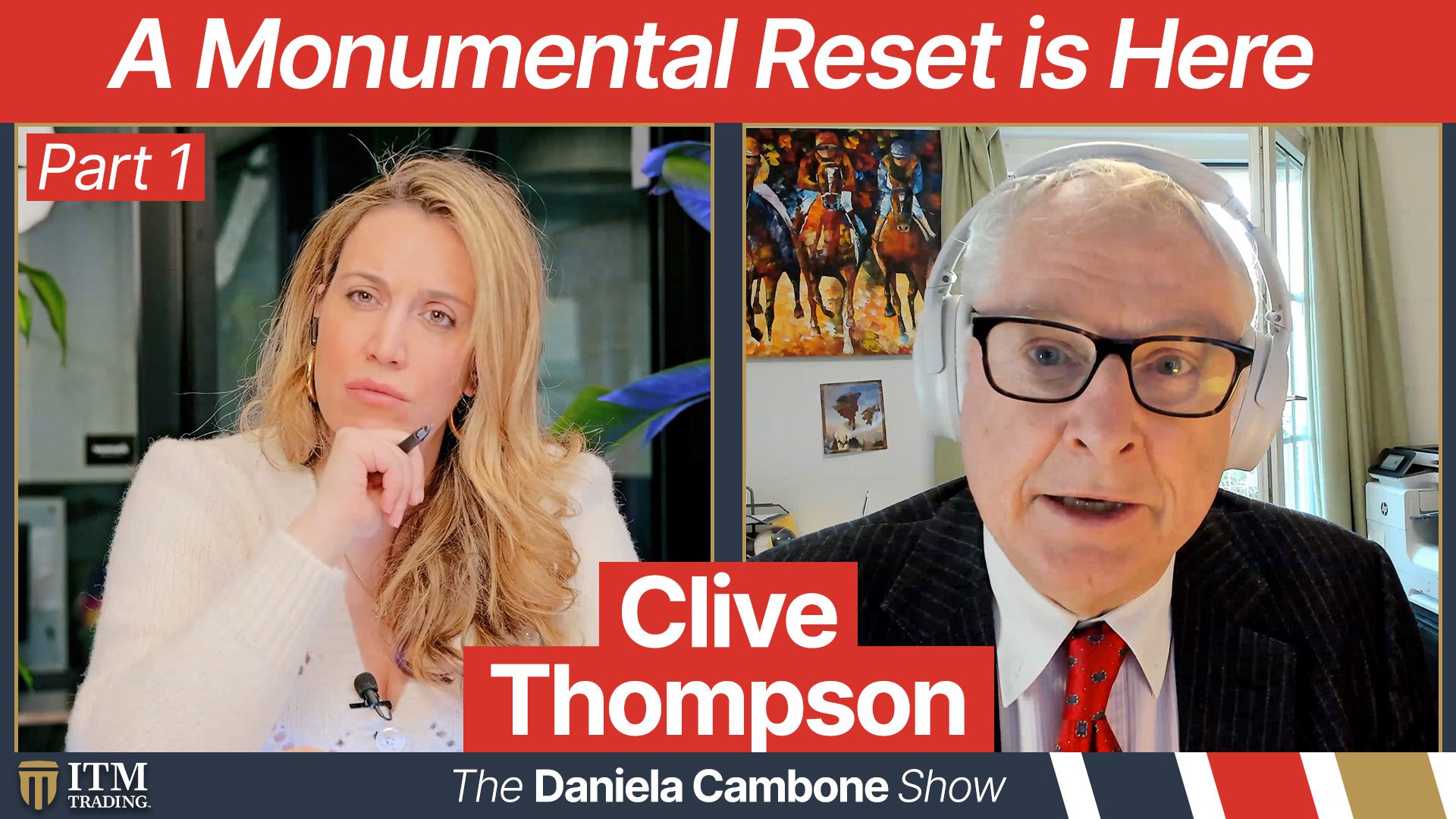Here’s Why a Financial Crisis As Early as April is in the Cards: Lynette Zang & Daniela Cambone
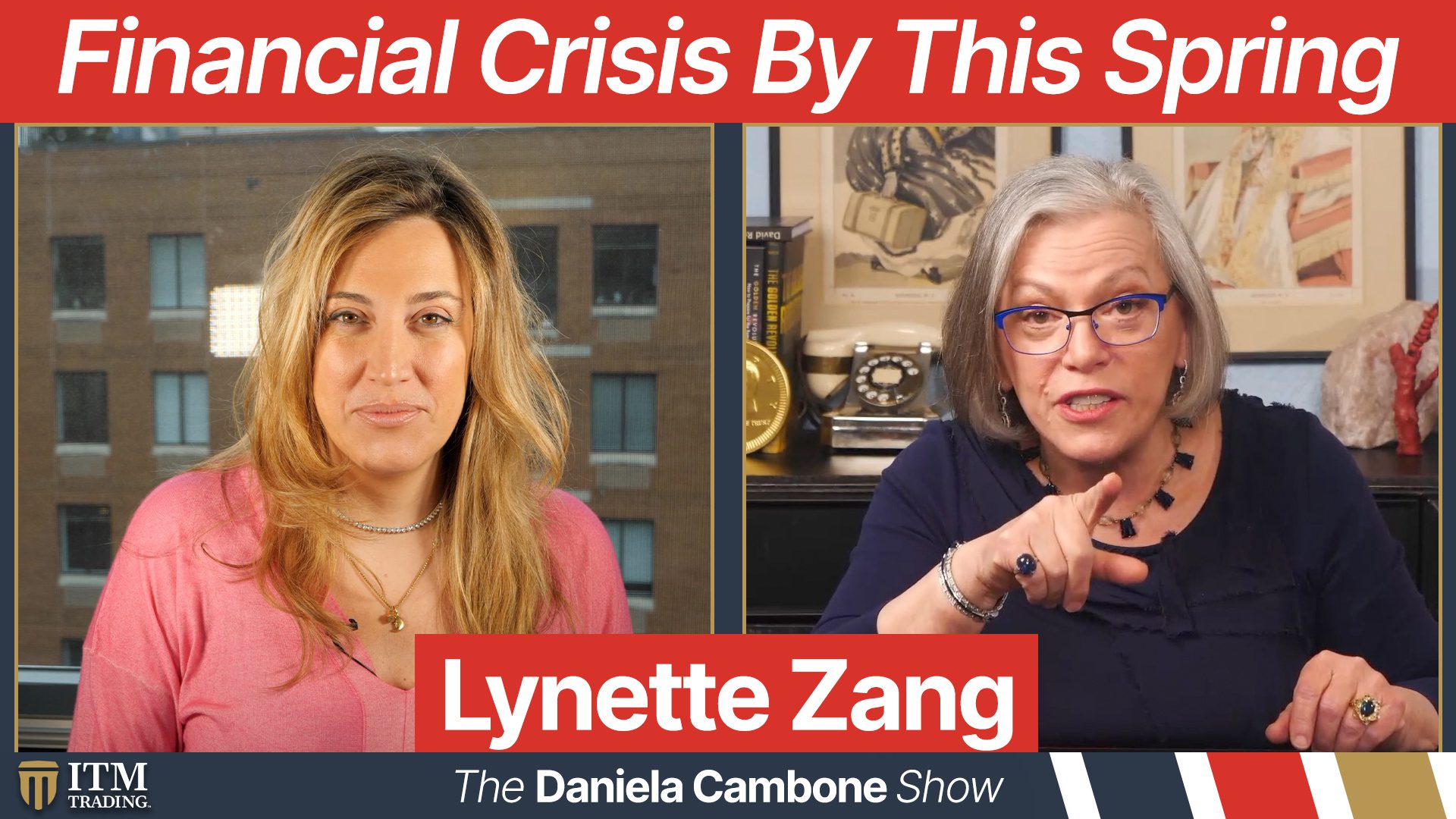
Daniela Cambone engages with Lynette Zang, Chief Market Analyst at ITM Trading, in a recent conversation and covers various crucial topics including inflation, U.S. debt, the pitfalls of private equity scams, Central Bank Digital Currency (CBDC), and strategies for investors to safeguard their wealth. Zang issues a stark warning about the impending adverse impacts on people’s lives as the U.S. economy becomes increasingly entangled in escalating treasury debt.
“Just lowering the interest rates, even lowering them back to zero, isn’t gonna help. It’s not gonna help all that massive amount of debt. I think we could see some level of crisis by this Spring,” Zang asserts. She highlights a recent surge in the velocity of money, attributing it to the public’s fear of the U.S. dollar losing value. “They’re rushing to spend it… indicates that for me the beginning of the hyperinflation.”
She also discusses the risks in private equity and the potential trigger for the next financial crisis. Zang emphasizes the importance of community and maintaining hope as essential to navigate these challenging times.
CHAPTERS:
0:00 US economy
6:10 Hyper-inflation
8:52 Milei Davos
10:29 The Great Taking
13:24 U.S. debt
16:32 U.S. stocks
18:10 Treasury debt
19:25 Private equity scam
23:30 Job cuts
25:15 Question for Lynette
31:11 CBDC
32:15 Strategy
TRANSCRIPT FROM VIDEO:
00:00
Hello, I’m Eric Griffin, president of ITM Trading. Lynette Zang and ITM Trading have been working together for over 22 years. We’ve made over a thousand videos together and provided you with a deep dive and technical analysis into economics, banking, and currencies. Like everything in life, nothing lasts forever. And Lynette has recently moved in another direction. This interview with Daniela Cambone will be the last of hers on the ITM channel. We wish Lynette the absolute best in her new pursuits and appreciate her greatly.
00:29
ITM Trading has been here for you for over 28 years, and we’re here to stay. Our team is continuing to grow, to provide you with the best information and expert analysis to protect and grow your wealth for many decades into the future. With our entire team of analysts and journalists, our research, interviews, and education will continue to be top-notch. It has always been our mission to empower you with knowledge so that you can take back ownership of your wealth and personal freedoms, and we will continue to do that.
00:56
In addition to Daniela Cambone interviewing experts in every field and Taylor Kenney simplifying the many complexities of what’s unfolding, we will also continue adding analysts to the channel and team as this year unfolds. So stay tuned and enjoy this video with Daniela and Lynette.
01:16
Hi, this is Daniela Combone and welcome back to the Daniela Cambone show now on ITM Trading joined today by Lynette Zang, Chief Market Analyst for ITM Trading and who I have the pleasure of working with now on a daily basis. Lynette, so good to see you. Welcome back. Well, thank you so much, Daniela. I love working with you too. There’s no doubt about that.
01:39
I know you were one of the keynote speakers at the Vancouver Resource Investment Conference, a city I absolutely adore, an incredible conference. How did it go? How was it? Well, you know, as always, it was a fantastic conference. And I have to say that you were actually a huge topic of conversation with everybody, congratulating you on the move and congratulating ITM on getting you. And you were missed.
02:07
Everybody was like, where’s Daniella? Where’s Daniella? We’ll have to do that show together next year. Absolutely. That’s great. Well, I heard that your panel was phenomenal. And I know we can’t get to everything today, but we’re gonna try and get to some of the topics. So let’s start with this one. Okay. Because…
02:28
Everything seems rosy now, Lynette. I mean, I’m pulling up Bloomberg, right? Tell me, tell me what the truth is here. US job openings unexpectedly rose in December to the highest level in three months, highlighting a robust labor market that’s powering strong economic growth. And we have US consumer confidence, which increased in January to the highest level since the end of 2021 as Americans grew more upbeat about the economy and the job market amid more sanguine views about inflation. Yep.
02:57
And adding to this Lynette, we have the IMF lifts world GDP outlook on US strength, China fiscal support, global economy now seen expanding 3.1% this year, 3.2% in 2025. I bring this up because just three weeks ago, our friends at the World Bank said the world nears the midpoint of what was, what was intended to be a transformative decade for development. The global economy is now set to
03:25
rack up a sorry record by the end of 2024. They said the slowest half decade of GDP growth in 30 years. This is according to analysts over at the World Bank. So now we have IMF saying everything’s great. World Bank saying not so much. I’m reading Bloomberg. They’re telling me the U.S. economy is strong. Lynette, Lynette help. Well, what is called perception management and cognizant dissonance. That’s really what it’s called.
03:55
You know, they think that it’s all about opinion at the same time that you can clearly see that the value of the currency is headed towards zero. Why do they never talk about that, right? Why does nobody ever talk about their own data? But in reality, people, food inflation is still soaring, yet it’s coming down a little bit over here with eggs and maybe a little bit over here with milk.
04:22
but in all the other areas, it’s soaring. And so even when you’re looking at the latest jobs number, what jobs are those? Are those the high paying jobs when we’re also listening to all these layoffs in the banking sector and the mergers and acquisitions sector in, well, I don’t know, how many companies are laying off how many people? So…
04:47
You know, it really doesn’t make sense if you are living through it and you’re still struggling to pay your bills because inflation has begun to rear its ugly head again, even in the official numbers, which we all know are pretty bogus. So it’s just a lie to sucker you into getting a level of confidence. Maybe they can pull this off, but…
05:14
Here’s the question. And maybe you know the answer because nobody else seems to know the answer to it. What happens when the purchasing power officially gets to zero?
05:28
You’re talking about the US dollar. Yes, I am, but that would be true for every single fiat currency. I mean, that was true for all these, right? And then some. So what happens when it gets to zero? Well, we saw the monetary velocity chart on just the M2 because of course they took the M3, the full money away from us in 2006, but I’m seeing a spike.
05:55
in the monetary velocity in a very, very, very pervasive way. This is what I was looking for to indicate the start of the hyperinflation. So I just don’t want you to know it. Wait, can you tell us more about your findings or what are you seeing? Absolutely. Monetary velocity is the number of times that money changes hands. So let’s just say I have a good week.
06:24
And I decide, okay, maybe I can afford that car that I was wanting to buy but was postponing. So now, okay, I had a good week, I’m going to the car dealership, I buy a car, that money is transferring to say, the person that sold me that car, and that person goes, gee, you know, I had a pretty good week, maybe I’ll take my spouse on that weekend that we were talking about. So now,
06:50
the money changes from my hands to his hands, they go on vacation and it’s transferring again. And hey, they go to a restaurant, he’s feeling flush, they leave a bigger tip and the wait person goes, well, now I can buy Jimmy the sneakers that I was wanting to buy him. So it’s the speed at which money changes hands and it is an indication of a truly robust economy for a while up until.
07:19
1997, was the last time that debt was actually stimulative in the economy. But ever since 1997, it has been dropping to levels below where it was back in 1933 during the Great Depression. Lately, it has been spiking because there have been a couple of blip-ups.
07:47
But they were not pervasive. They were small blips Now it is going up in a pervasive way Which is more of an indication that people realize that the currency is losing value. That’s that rapid inflation Right, right. They’re rushing to spend it while it still has some value before the prices of those goods and services go up and that’s why that
08:16
major, major, major pattern shift in the velocity of money indicates that for me, the beginning of the hyperinflation. And we are hearing this around the globe and even in this country, how sticky inflation is, how it started to move up a little bit, they’re playing it down. And I think that all of this good news,
08:43
is about hiding what’s really happening. It’s just a distraction. Well, you know, as you’re speaking and while you were at VRIK, Argentina’s Malay was speaking, you know, to the crowd at all the elites, Davos at the World Economic Forum. And you know, what you’re saying, you know, basically is what he was echoing. He called on business and political leaders at Davos to reject socialism and instead embrace free enterprise to bring an end to world poverty.
09:11
poverty because he said, I’m here to tell you that the Western world is in danger and basically headed towards poverty. Right. And he spoke of this hyperinflationary situation and whatnot. So it seems like, you know, what, I don’t even know how to, how does one prepare for such a situation, Lynette? Oh, food, water, energy, security, barter ability, wealth, this is barterable for me, wealth preservation.
09:41
community and shelter, you get yourself as independent and self-sufficient as you can. Because food, and we’re already seeing that around the world, food becomes the single biggest issue for people around the world. So what can you do to create security in all of those areas? And you know, for me, I absolutely knew without a doubt in my mind that the system died in 2008.
10:11
So I started on this journey. I wasn’t a farmer. I wasn’t even much of a gardener. You know, that wasn’t my thing. But, you know, as an economist, I cannot deny what I see and what I know. And you know, we had David Rogers Webb on, I know you took a deep dive on the great taking. Absolutely. And he says the same thing. I mean, he says he didn’t wanna be a farmer. Now he’s, you know, full-fledged farmer in Sweden.
10:41
You know, he said he’d much rather be, you know, doing his groceries at Whole Foods, but he’s kind of been taking the same preparatory path that you’ve been on, Lynette. You know, you have to be because if everything, if you are dependent upon the system and the system goes down, you’re going to have to accept the CBDCs and the austerity and every other thing they’re going to cram down your throat till you have lost all of your liberties. Yes.
11:10
Yes, and we’re going to get back to CBDCs in a second because I know the last time we spoke was before Christine Lagarde’s New Year’s Eve message, which I’ll get back to. But another article I wanted to pull up, Black Swan author Nassim Nicholas Tlaib said the US deficit is swelling to a point that it would take a miracle to reverse the damage. I know this is going to speak to your heart here, Lynette, because he says, quote, so long as you have Congress keep extending the debt limit and doing deals because they’re
11:40
the consequences of doing the right thing, that’s the political structure of the political system. Eventually you’re going to have a debt spiral and a debt spiral is like a death spiral. Yes, indeed. Absolutely. I mean, you know, we are so our GDP, which is all the money that flows through the system is at what? 27 trillion? Yes. The debt is some north of 33 trillion.
12:08
And is that really everything that we’re seeing? Because what they let us see is just the tip of the iceberg. And we’re really looking at quadrillions and we’re watching the bankers get into position for what they call consolidation. But that really is banking crisis where people, yeah, they avoided the bail in, well.
12:33
They didn’t. They bailed in the system back in March, but those issues have not gone away, especially with the interest rates. And when you’re talking about a death spiral in debt, look, when you have debt, whether you’re a government, a corporation, or an individual, you have to service it. You have to pay the debt. You have to pay it off. You have to roll it over, or you have to default. It’s not like you got a million choices.
13:04
Well, you know, with interest rates held at zero for so long and this massive wall of debt that’s coming due, whether it’s governmental, corporate, or individual, into this significantly higher interest rate environment. Yep. So, but people will say, well, can’t they just keep, won’t they just keep printing then to service that debt, Lynette? Yes, they will.
13:31
What we’ve witnessed since 2008 is that it takes more and more and more of that printing and they get less and less and less result because it’s all about the confidence. And we’ve witnessed since 2008, the bank-to-bank confidence was gone as witnessed by the interbank lending. The
13:56
central bank to central bank confidence was gone, as we witnessed in 2015 with the Swiss surprise. And we can go into those specifically, but we’ve just been, and then what was a year ago, last June, when the central bank to the Wall Street crowd, they lost confidence. There’s only one level of confidence left. So it’s not like you have all of these to go through.
14:25
we are at the end and that’s the public confidence. And that’s why what you brought up in the beginning is so critical. Because if you aren’t feeling it yourself, if you have enough income that inflation doesn’t really impact, whether or not you can put food on the table or gas in the car or buy the things that you want, you think everything is fine. But at that lower level, where all of that matters.
14:54
Well, there’s a lot of unrest that’s happening and we’re also witnessing a lot of creep. In other words, those that are getting hopeless and hungry, creeping into neighborhoods that are not. Absolutely, I see it all the time. And that’s why I think I speak for a lot of folks watching Lynette, is when I hear these talking heads of Janet Yellen and everyone telling me that inflation’s coming down, I’m thinking I’m not feeling it at all.
15:22
Right? My friends, my neighbors that I speak with, they’re not feeling it. And we’re frankly tired of people trying to convince us of the contrary here. Right? Well, you know, when this was all unfolding, so I’ll say since 71, as they kept dropping those interest rates and it looked like income was growing, but it was never growing at the pace of inflation.
15:50
And that was all by design really since 1913. But people could say, well, look at this, you know, 9,500 was the average wage in 71. I’m making 54,000. I’d rather have 54,000 than 9,500, but that 9,500 could support a family of four. I’m not saying they were rolling in it, but they only needed one worker to support a family of four.
16:18
And today you need two wage earners, even if they are making 120,000 a year, not only are they paycheck to paycheck, but they are deeply, deeply, deeply in debt. Yes, yes. Okay, another worrisome article here about the dominance of the 10 biggest stocks in US equity markets is increasingly drawing similarities with the dot-com bubble.
16:44
Yeah. Raising the risk of a sell-off. This is according to JP Morgan Chase quantitative strategist. The share of the top 10 stocks on the MSCI USA index, including all the so-called Magnificent Seven tech stocks has risen to 29.3% by the end of December. This is according to strategist at JP Morgan. That’s why it surprises me. I know I had Greg Mannarino on last week, a friend of yours as well. I love him. You know, and he says he’s taking advantage of the bubble.
17:14
inequities, but frankly, it’s terrifying. Well, it is terrifying because these top firms are in every single mutual fund pretty well, pretty much almost every single ETF. So that means they’re in your 401k, they’re in your pension plans, they’re in your IRAs, they’re inside. And that bubble is just waiting to burst. And what’s going to keep it afloat?
17:43
more free money? When is the Fed going to pivot? We’ve got the spring coming up and there are a lot of dangerous black swans that are flying right around that area. And when the Fed turns around and lowers those interest rates again, I mean, what’s that really telling us? But that we’re in very deep doo-doo. And I think it’s too late. And, you know, we always talk about how there’s a lag effect of how long that takes to hit the system.
18:13
So when that pivot does happen, right, when do we feel the after effects of that? You know, the more they do, the more fragile the system gets. And a big part of the problem is the treasury debt levels that have, you know, I mean, they’re issuing so much treasury debt as the Fed and other central banks and other typical longer-term players have stepped back.
18:42
I think that we’re going to see it almost instantly. I think we will because I think people are going to recognize at that juncture that we have a big, huge problem. And just lowering the interest rates, even lowering them back to zero, isn’t going to help. It’s not going to help all that massive amount of debt. So I think we could see…
19:10
some level of crisis by this spring. I really do. I really do. By the spring. Yeah. Yeah. I’ve been feeling that. I’ve been feeling that. I know. So yeah, as early as the spring. Well, let’s, let’s couple that because you did an incredible deep dive. I invite everyone to watch it on private equity. Yeah. And I want to talk a little bit about this because I also had Jim Rickards on recently.
19:38
And I think he basically perfectly signed up the bank, the banking crisis by saying, you know, there’s always these periods of, you know, we were covering it so much and then investors forget. And then it seems like it went away until bam, it comes back with a vengeance. So do you not feel that creeping back into the system that I sure the banking. Okay. So I sure. And so let’s talk a little bit about the deep, deep dive you did where you.
20:05
talk about the power shift between fund managers and investors as shaking Wall Street, raising questions about market stability. You call it a private equity scam. You talk about the risk transfers from elites to many millionaires. And you said this could be for you, the trigger for the next financial crisis. Exactly. And all of that is coming up because what happened was
20:32
private equity, what do they do? They privatize the gains and they socialize the losses. And so the gains from all of that free money, which is what private equity had absolute access to and is going away, but who’s gonna support all these debt levels going back to even all of those stocks? I mean, the stocks that you were talking about are just one of them. You remember the unicorns?
21:01
Yes. Yes.
21:30
to see that the consumer, the person on the street, the public, the risk is being transferred to them very systematically. And yes, who’s gonna support these prices? Well, they’re counting on the consumer to do it. And as you said, the mini millionaire, those tech people or those people that are making like 150,000 and more.
21:59
They’re not really millionaires. Even if they have quote unquote a million in assets and just look at Zimbabwe, you could be a trillionaire there and not be able to buy eggs. But this is all about risk transfer. And my question is, you know, it’s like the game of hot potato, right? And you keep throwing the potato and at some point you’re left holding that hot potato when enough.
22:26
risk has been transferred, it will get too expensive even to attempt to print their way out of it. And that could do it. I mean, that’s what I’m saying. There are so many different things. You know, the repo market, there are just so many different things that could trigger something and this feels to me like a Stephen King novel where, you know, you got
22:51
You’ve got all of these things that are occurring on the outside, but they’re all coming together in a central location. And to me that central location are treasuries, because that’s the foundation and it’s going like this. Well, 10 year treasury, you’ll look at it, look at it today as we’re speaking on it. Yep. Um, but it’s just funny as we’re speaking this news just out, because just circling back to how I started the segment with you about how great the economy is.
23:18
Look at all the job cuts we keep hearing about UPS now just announced 12,000 job cuts says package volume slipped last quarter. You know we saw wayfair and whatnot the list goes on of all the layoffs we’re seeing. I mean it doesn’t match. Like we’re getting such different narratives. That’s what I always keep coming back to and say you know where does the truth lie? Right? The truth always lies in the data. Not in what they say.
23:47
And that takes you back to the cognizant dissonance because what happens is when people hear all of these conflicting things, your mind can’t really deal with that. So they choose something for normalization that they can live with. And who really wants to know the awful things that are happening? You know, I’ll tell you a little story. I have this friend and we were up at the bug out house.
24:16
and we were talking and she said, yeah, I haven’t really been feeling very well for probably about six months now. You know, this is bothering me, that’s bothering me. I said, well, did you go and get some tests, go to the doctor and find out what’s going on? And she’s like, no, and I’m not going to, cause I don’t wanna know. And like, that doesn’t make sense to me. If there’s something that’s going on,
24:43
I go to the doctor every three months. I get my blood tests. We just had a meeting yesterday and she’s like, okay, this is great, this is great. Adjust this, adjust that. I wanna know well ahead of time when there’s a problem with my health or with my wealth so that I can make educated choices that puts my best interest first.
25:11
Absolutely. I’m with you 100% there, but I too know so many people who just prefer to keep their head in the sand and not know, right? Yep. And not deal with it. But then we have to be prepared as part of the community, Daniela, to take care of those people as best we can. And, you know, that’s really what I figured out in Australia. I mean, I’ve talked about it for a long time, because I know how important community is.
25:41
but we’ve got to have a local community. So, you know, get to know your farmers markets and you live in a big city, that’s a little more challenging than, you know, Arizona’s and Phoenix’s more spread out. But you really need to take some time to get to know people, purveyors of food and who can supply water. I mean, you’ve got to create these relationships because I’ve had 13 years to prepare.
26:09
I don’t even still feel that I’m fully prepared. Well, perfect segue. Perfect segue because I cannot tell you the amount of emails I received, questions for Lynette after that whole great taking video that obviously went viral and people were like, well, what would Lynette do and whatnot? So I can’t get to all the questions, but I thought this one was a good one that kind of summed up and it comes from reader.
26:38
David or viewer David Connor. And he says, the information presented in the great taking certainly presents additional variables that makes surviving the incoming financial crash extremely difficult. I appreciate Lynette’s efforts to show and discuss her self-sufficient community and properties. Clearly this is the way to go, but it is late in the hour to procure these properties and completely pay off such a property in light of the book by David Webb and
27:06
what new strategies or active steps can we take to protect our wealth and our family? So he feels he’s running out of time, maybe he can’t get a bug out, you know, for whatever. Not everyone has obviously the financial means, the time, whatever. But do you know what everybody does have? They have gifts that they were born with and that they’ve developed over time. I mean, believe it or not, I can actually lay irrigation. That was never a goal of mine.
27:36
But, you know, any talent you have, any skill you have, anything physical that you have is barterable. And so we really need to come together in local community so that you can weather.
27:53
this storm because maybe somebody has been stockpiling food, maybe you’ve been stockpiling gold and silver, maybe you have the skill sets that you’re a good cook and you’re an electrician and you’re a doctor and you’re this and that and the other thing. So I agree with him. We don’t have that luxury of time anymore. And that makes community that much more important. And wherever you are, whether you’re in a city,
28:21
whether you’re in, I mean, do you know how you would get out of the city? I’ve thought about it many times. So the path is in my head. I mean, there’s not many ways out of the city. That’s the problem. As you know, Lynette, as a New York girl. Yep. That’s the problem. But there might be a heliport. There might be a heliport near you. Right? There is a heliport, right? Because you
28:46
can’t count on the bridges. Exactly. You’re going to need to be able to go over them. I would, if I were you, I would create that relationship right now. Yeah. I, I would, you know, I would really figure out because one of the things that I’ve heard from like thrivers and other people in the group that are living in these high rises, even though they left America, but they’re living in these high rises. And so that creates a limitation on how much food they can create and hold.
29:15
how much water, you know, those kinds of things. I’m telling you, we are running out of time. There’s no doubt about it. And so coming together in a local community is critical. There are community gardens in New York City. Yes, yes, yes. Get involved with a community garden. You know, but this is what you have to do. There are meetup groups all over the place.
29:43
Bring your talents and skills even if you don’t know what they are, if you can still, you know, dig some dirt or, you know, learn some new skills. And then also, Daniela, this has to be global because what is coming down the pike from us? I mean, I was just reading some headlines this morning from the IMF, who in my opinion is most likely to be the next the world reserve currency.
30:13
And, you know, they’re saying to in the UK, well, you can’t lower taxes because they’re talking about lowering taxes ahead of the election. You can’t lower taxes because you need that money to offset. I don’t know all the spending that you’re doing. And, you know, I’m reading what the IMF is saying. And when you look at the control that they’ve had, like in Greece, where it was just one austerity measure after another austerity measure, after another.
30:43
It’s beating the people down so that you end up in a feudal society. And we’re going full circle. And I think it was Einstein, and this is not going to be an exact quote. But he said, I’m not sure what the Third World War will be fought with, but the fourth will be fought with sticks and stones. We’re going full circle. These are all patterns. And they repeat. And not to…
31:10
Not to take a deep dive here on central bank digital currencies. I’ll save that for another time. But I mentioned Christine Lagarde because I had spoken to you before her New Year’s Day message. Yes. We always get people coming up to us saying, do you really think central bank digital currencies are a thing? I’m like, people, they’re telling you. She basically said, it’s the 25th anniversary of the Euro and get ready for the digital form of the Euro. The IMF has come out saying they have white papers for countries working on all their pilot projects. So I mean, they are not even, they’re all hiding.
31:40
the agenda for central bank digital currencies. And full surveillance and full control. And that’s what makes having money outside of the system completely so critically important. And as the last note here, as we wrap, because we also talk about so much about strategy and what we do at ITM, I thought now that I have you here, if you could just talk a little bit about when we say, you can…
32:09
chat with one of the folks over at ITM Trading with the Calendly links, but when we talk about getting a strategy, what do we mean by that? Well, I’ve been studying currencies since 1987, and I’m so grateful that I did. You and I both worked on Wall Street for a while, because what you do is you see, I mean, there’s well over 4,800 currencies that don’t exist anymore, and they all have the same kind of pattern.
32:36
which means that if you understand where we are in this cycle, you can understand what the next most likely thing is to happen, and therefore you can get into position with your investments, with your food, with that whole mantra piece before you really need it, because I’d always rather be, I don’t care if I’m 10 years too early, I just don’t want to be one second too late. So it is about, the strategy is about
33:02
What is most likely to help you sustain a standard of living, preserve the wealth that you have to or choose to keep inside of the fiat money markets. Get into a position to have that wealth transfer your way as this whole market shifts, so that on the other side of this mess, number one, you’ve been able to maintain your freedoms and your liberties.
33:31
for yourself and your family and those people that you love and sustain a reasonable standard of living in the meantime and on the other side of this, you are in even a much better position than you were entering it. Because one thing I learned from Jim Rickards is dynastic wealth. And that is wealth that has lasted in families at least 300 years. And it has three legs, makes it pretty simple.
34:01
real estate, although that’s overvalued right now, truly rare, rare collectibles. Look at the Queen of England and gold as the foundation. And you can do all three with gold because you can have a gold mine, you can have gold coins and you can have gold rare antiques or rare pieces, but you know,
34:30
There’s nothing else that has lasted 300 years, but those things. And you need to be able to, if you have gold, not only can you accumulate them when they’re cheap, but you can maintain whatever you have. Cause real estate is not something that you can put on your back and move. So that has a tendency to get taxed like crazy. And the strategy really looks at all of that, and it has to start with your goals.
34:58
beautifully said, I thank you for helping with that and for your time. And you know, it’s such a beautiful, it can be a beautiful world is more. Yes. You know, it really can be. And it’s sad that, you know, we are living in these times that you need a plan B, you need a plan C, but it’s just the reality of things, unfortunately. It is. And you know, I have to say this too, though.
35:27
because there are others that say, well, what can we do about it? Well, nothing if you give up, but I am never gonna give up, absolutely. And what really makes me feel good are all the younger people. I mean, that was definitely something I saw at VRSC, but it’s all the younger people that are starting to wake up and starting to want to understand this. Yeah, I heard, I heard.
35:56
I heard that there was just a much younger demographic, which I just, I’m thrilled to see. And I already feel so much better speaking with you. Every time I speak with you, my mood changes like that. You’re just ball of positivity, despite all the gloom that we’re seeing. So thank you, Lynette. Thank you for being you. Thank you for all you do and educating us. We appreciate you. Well, Daniela, I mean, you are definitely one of my most favorite people. And I mean that. I want you to know this.
36:25
I mean that from the bottom of my heart. Thank you Lynette. Feel the love and don’t forget to sign up at danielacambone.com so you won’t miss a beat. You’ll stay on top of all the great interviews and we’ll see you soon. That’s it for me.
SOURCES:
https://www.imf.org/en/About/Factsheets/Sheets/2022/IMF-World-Bank-New
https://fred.stlouisfed.org/graph/?g=rocU
https://fred.stlouisfed.org/series/M2SL#
https://www.cnbc.com/2024/01/30/ups-reports-drop-in-package-volume-stock-tumbles.html
